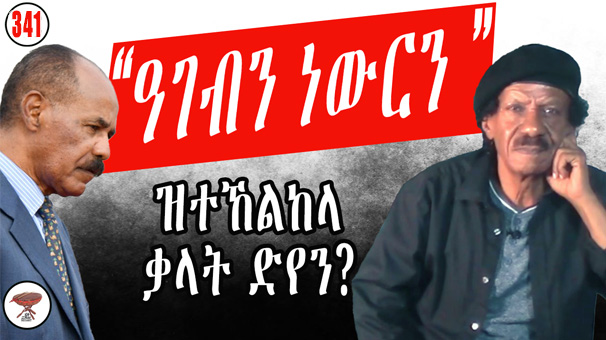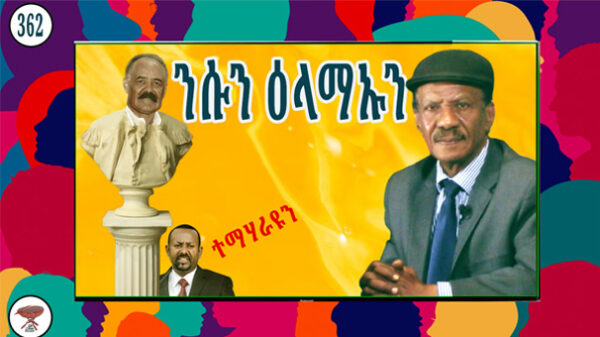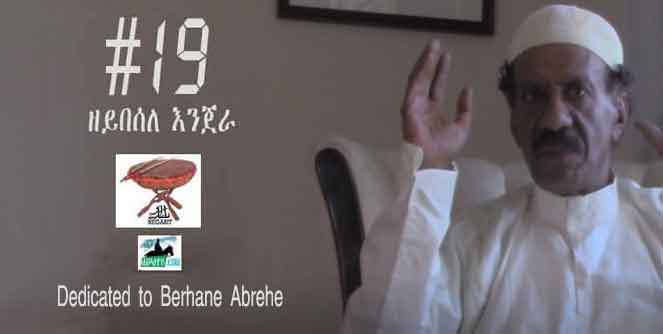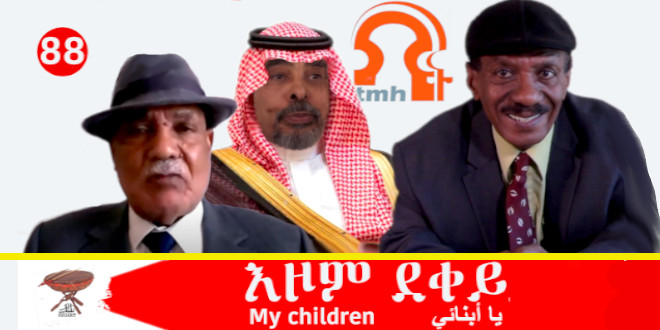Ageb and Eb, are these words alive in our languages!
I have talked and written hundreds of essays about reconciliation; the website I founded carried the slogan of reconciliation as a guiding principle. That’s because I believe it’s a vital precondition for a peaceful coexistence, unity, and stability. And citizens must be aware of the different social components—their culture, values, and grievances. Reconciliation requires awareness, and ignorance hinders the achievement of a reconciled nation. And what needs to be reconciled must be identified in a national process of dialogue.
The PFDJ regime failed in reconciling the nation. Instead, it dwarfed it to a mere mimicking of each others’ songs and imitating folkloric dances. That didn’t and will not bring about reconciliation or unity but trivializes it. Eritreans struggled with zeal to defeat occupiers, but the regime weakened that zeal. Thus, it systematically disabled and terrorized the people from pursuing justice and true freedom. Today, Eritrea is ruled as the private property of a cult, and those who do not submit to the PFDJ are citizens mostly exiled or treated as outcasts. The nation that paid a hefty price in pursuit of freedom is left with an illusionary freedom and no semblance of justice.
Compared to the rulers of the past, the PFDJ is no less an oppressor. It’s pissing on citizens just like the oppressors of the past did. Let me tell you a sample entertaining story that happened with the heroic struggle—the story of a combatant who would literally be pissed on.
The nick, Land Rover
After a long walk, one day as his squad was resting behind a sand dune. Suddenly they heard “Ethiopian commandos” trucks behind the sand dunes, and enemy soldiers jumped off the trucks to rest. Mohammed and his colleagues dispersed and ran for cover. But there were few places to hide except for some Aday bushes. Landrover headed to the bush, jumped in, and squatted still. “My heart sounded like a drumbeat,” he said.
He could see the faces of the soldiers; one of them kept walking towards where Mohammed was hiding.
“I was sweating myself and could see sweat drops on the soldier’s face.”
Land Rover cocked his gun, ready to shoot the soldier. He hesitated because he was not sure if his colleagues had reached a safe place. He mustered enough courage and stayed fixed in his place.
The soldier seemed relaxed and hummed a song while he opened his fly, stood there close to Mohammed, and started to pee. “His urine fell like rain all over me, but I stayed breathless and immobile.”
The soldier emptied his bladder, walked back to the truck, and it left. Land Rover run fast up the distant gorge. There he found his squad members and joined them in his dump clothes smelling of putrid beer. They were relieved to see him alive, and once they heard his hilarious urine story, they couldn’t stop laughing. ‘Piss-bath’ became his nickname until it was replaced by another nick: ‘Land Rover.’
Mohammed “Land Rover”
The skinny Mohammed was assigned to lead hundreds of new recruits from the Eritrean Highlands to a training camp on the border with Sudan. The journey was long, and it meandered through rugged mountains, empty plains, and deserts with scorching sun.The culture differed, the terrain was unfamiliar to many, and the language, though slight, differed. The Land Rover took longer trails to avoid the many enemy camps.
The skinny Mohammed was a veteran combatant and walked like an antelope as if not noticing the difference between mountains, plains, gorges, or harsh desert. That fast-paced walking earned him a nickname by the city boys: Land Rover!
The recruits he led were drained due to shortage of water, hunger, and fatigue; a few city boys almost collapsed midway, but Land Rover inspired them. They wondered, ‘If this tiny guy would do it, why can’t I?’
‘Land Rover,’ the always smiling, kind-hearted country boy, safely led recruits to Ribda military training camp, a ten-day’s distance from where they started. He left a perception of a giant in the eyes of the recruits and earned their admiration.
Mohammed didn’t know it then, but his old nick, ‘Piss-bath,” was replaced by Land Rover
Some years later he was in the same with me, and whenever we met while camping or walking, those he led on the trek to Ribda met him with so much respect. They sprang up from their units to hug Landover.
Some had started to climb up the military hierarchy or become officers in different departments.
The story ended, but memories stay forever.
What is in a story?
I am certain many of you are smiling if not laughing. See how a small story alters the mood? It is entertaining and makes us humans compassionate, even proud. There are inspiring messages behind stories; they scratch and peel our stiff veneer, the inhuman skin, and expose our feebleness and our true sentimental nature.
Probably you never met Land Rover, but now you have. His picture is already in your imagination. You have become friends with Land Rover and many like him who had a life full of emotions. They cried, they laughed, they killed, and they got killed. They are not numbers but lived and had families, lovers, friends, and relatives. Is the imagined picture of Land Rover still in your head? Are some of you remembering the unmentioned hardships of the combatant’s struggles and hardships, from Barka to Gash to Sahel to Sawa and everywhere else?
Land Rover’s story is about a precarious situation, and many can relate to it and to stories of those who paid the ultimate price, their lives. Let’s remember the hard times and the fallen heroes, especially those who didn’t leave a body to be buried. Only the dishonorable dishonor heroes; only those who are not worthy of respect and the indecent—those with pumping hearts inside their chests—understand that.
Lives were not wasted in vain; they were the price of national dignity, honor, peace, and prosperity. That’s why we should not accept when anyone is thrown in jail unfairly, or for not submitting to tyranny, and be abused and humiliated because they rejected servitude to the cult and its leader. If people are free in spirit, they must demand their rights; nay, they snatch the freedom whose dues they paid in full. Don’t just carry the scars and memories etched in the minds—they must be cured. And only justice and freedom are the remedy. Wasn’t all the trouble in search of freedom?
We had a common word in our vocabulary: Ageb! Do we still have it, or is it erased from our memory? If not, let’s scream Ageb! —Ageeeeeeb





Awate Forum